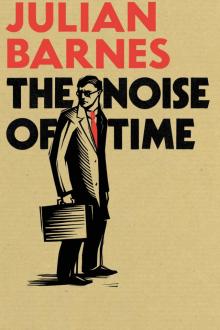- Home
- Julian Barnes
The Noise of Time
The Noise of Time Read online
Contents
About the Book
About the Author
Also by Julian Barnes
Dedication
Title Page
Epigraph
One: On the Landing
Two: On the Plane
Three: In the Car
Author’s Note
Copyright
About the Book
In May 1937 a man in his early thirties waits by the lift of a Leningrad apartment block. He waits all through the night, expecting to be taken away to the Big House. Any celebrity he has known in the previous decade is no use to him now. And few who are taken to the Big House ever return.
So begins Julian Barnes’s first novel since his Booker-winning The Sense of an Ending. A story about the collision of Art and Power, about human compromise, human cowardice and human courage, it is the work of a true master.
About the Author
Julian Barnes is the author of twelve novels, including The Sense of an Ending, which won the 2011 Man Booker Prize for Fiction. He has also written three books of short stories, Cross Channel, The Lemon Table and Pulse; four collections of essays; and two books of non-fiction, Nothing to be Frightened Of and the Sunday Times Number One bestseller Levels of Life. He lives in London.
Also by Julian Barnes
FICTION
Metroland
Before She Met Me
Flaubert’s Parrot
Staring at the Sun
A History of the World in 10½ Chapters
Talking it Over
The Porcupine
Cross Channel
England, England
Love, etc
The Lemon Table
Arthur & George
Pulse
The Sense of an Ending
NON-FICTION
Letters from London 1990–1995
Something to Declare
The Pedant in the Kitchen
Nothing to be Frightened of
Through the Window
Levels of Life
Keeping an Eye Open
TRANSLATION
In the Land of Pain
by Alphonse Daudet
for Pat
The Noise of Time
Julian Barnes
One to hear
One to remember
And one to drink.
traditional
It happened in the middle of wartime, on a station platform as flat and dusty as the endless plain surrounding it. The idling train was two days out from Moscow, heading west; another two or three to go, depending on coal and troop movements. It was shortly after dawn, but the man – in reality, only half a man – was already propelling himself towards the soft carriages on a low trolley with wooden wheels. There was no way of steering it except to wrench at the contraption’s front edge; and to stop himself from overbalancing, a rope that passed underneath the trolley was looped through the top of his trousers. The man’s hands were bound with blackened strips of cloth, and his skin hardened from begging on streets and stations.
His father had been a survivor of the previous war. Blessed by the village priest, he had set off to fight for his homeland and the Tsar. By the time he returned, priest and Tsar were gone, and his homeland was not the same. His wife had screamed when she saw what war had done to her husband. Now there was another war, and the same invader was back, except that the names had changed: names on both sides. But nothing else had changed: young men were still blown to bits by guns, then roughly sliced by surgeons. His own legs had been removed in a field hospital among broken trees. It was all in a great cause, as it had been the time before. He did not give a fuck. Let others argue about that; his only concern was to get to the end of each day. He had become a technique for survival. Below a certain point, that was what all men became: techniques for survival.
A few passengers had descended to take the dusty air; others had their faces at the carriage windows. As the beggar approached, he would start roaring out a filthy barrack-room song. Some passengers might toss him a kopeck or two for the entertainment; others pay him to move on. Some deliberately threw coins to land on their edge and roll away, and would laugh as he chased after them, his fists working against the concrete platform. This might make others, out of pity or shame, hand over money more directly. He saw only fingers, coins and coat-sleeves, and was impervious to insult. This was the one who drank.
The two men travelling in soft class were at a window, trying to guess where they were and how long they might be stopping for: minutes, hours, perhaps the whole day. No information was given out, and they knew not to ask. Enquiring about the movement of trains – even if you were a passenger on one – could mark you as a saboteur. The men were in their thirties, well old enough to have learnt such lessons. The one who heard was a thin, nervous fellow with spectacles; around his neck and wrists he wore amulets of garlic. His travelling companion’s name is lost to history, even though he was the one who remembered.
The trolley with the half-man aboard now rattled towards them. Cheerful lines about some village rape were bellowed up at them. The singer paused and made the eating sign. In reply, the man with spectacles held up a bottle of vodka. It was a needless gesture of politeness. When had a beggar ever turned down vodka? A minute later, the two passengers joined him on the platform.
And so there were three of them, the traditional vodka-drinking number. The one with spectacles still had the bottle, his companion three glasses. These were filled approximately, and the two travellers bent from the waist and uttered the routine toast to health. As they clinked glasses, the nervous fellow put his head on one side – the early-morning sun flashing briefly on his spectacles – and murmured a remark; his friend laughed. Then they threw the vodka down in one go. The beggar held up his glass for more. They gave him another shot, took the glass from him, and climbed back on the train. Thankful for the burst of alcohol coursing through his truncated body, the beggar wheeled himself towards the next group of passengers. By the time the two men were in their seats again, the one who heard had almost forgotten what he had said. But the one who remembered was only at the start of his remembering.
One: On the Landing
ALL HE KNEW was that this was the worst time.
He had been standing by the lift for three hours. He was on his fifth cigarette, and his mind was skittering.
Faces, names, memories. Cut peat weighing down his hand. Swedish water birds flickering above his head. Fields of sunflowers. The smell of carnation oil. The warm, sweet smell of Nita coming off the tennis court. Sweat oozing from a widow’s peak. Faces, names.
The faces and names of the dead, too.
He could have brought a chair from the apartment. But his nerves would in any case have kept him upright. And it would look decidedly eccentric, sitting down to wait for the lift.
His situation had come out of the blue, and yet it was perfectly logical. Like the rest of life. Like sexual desire, for instance. That came out of the blue, and yet it was perfectly logical.
He tried to keep his mind on Nita, but his mind disobeyed. It was like a bluebottle, noisy and promiscuous. It landed on Tanya, of course. But then off it buzzed to that girl, that Rozaliya. Did he blush to remember her, or was he secretly proud of that perverse incident?
The Marshal’s patronage – that had also come out of the blue, and yet it was perfectly logical. Could the same be said of the Marshal’s fate?
Jurgensen’s affable, bearded face; and with it, the memory of his mother’s fierce, angry fingers around his wrist. And his father, his sweet-natured, lovable, impractical father, standing by the piano and singing ‘The Chrysanthemums in the Garden Have Long Since Faded’.
The cacophony of sounds in his head
. His father’s voice, the waltzes and polkas he had played while courting Nita, four blasts of a factory siren in F sharp, dogs outbarking an insecure bassoonist, a riot of percussion and brass beneath a steel-lined government box.
These noises were interrupted by one from the real world: the sudden whirr and growl of the lift’s machinery. Now it was his foot that skittered, knocking over the little case that rested against his calf. He waited, suddenly empty of memory, filled only with fear. Then the lift stopped at a lower floor, and his faculties re-engaged. He picked up his case and felt the contents softly shift. Which made his mind jump to the story of Prokofiev’s pyjamas.
No, not like a bluebottle. More like one of those mosquitoes in Anapa. Landing anywhere, drawing blood.
He had thought, standing here, that he would be in charge of his mind. But at night, alone, it seemed that his mind was in charge of him. Well, there is no escaping one’s destiny, as the poet assured us. And no escaping one’s mind.
He remembered the pain that night before they took his appendix out. Throwing up twenty-two times, swearing all the swear-words he knew at a nurse, then begging a friend to fetch the militiaman to shoot him and end the pain. Get him to come in and shoot me to end the pain, he had pleaded. But the friend had refused to help.
He didn’t need a friend and a militiaman now. There were enough volunteers already.
It had all begun, very precisely, he told his mind, on the morning of the 28th of January 1936, at Arkhangelsk railway station. No, his mind responded, nothing begins just like that, on a certain date at a certain place. It all began in many places, and at many times, some even before you were born, in foreign countries, and in the minds of others.
And afterwards, whatever might happen next, it would all continue in the same way, in other places, and in the minds of others.
He thought of cigarettes: packs of Kazbek, Belomor, Herzegovina Flor. Of a man crumbling the tobacco from half a dozen papirosy into his pipe, leaving on the desk a debris of cardboard tubes and paper.
Could it, even at this late stage, be mended, put back, reversed? He knew the answer: what the doctor said about the restoration of The Nose. ‘Of course it can be put back, but I assure you, you will be the worse for it.’
He thought about Zakrevsky, and the Big House, and who might have replaced Zakrevsky there. Someone would have done. There was never a shortage of Zakrevskys, not in this world, constituted as it was. Perhaps when Paradise was achieved, in almost exactly 200,000,000,000 years’ time, the Zakrevskys would no longer need to exist.
At moments his mind refused to believe what was happening. It can’t be, because it couldn’t ever be, as the Major said when he saw the giraffe. But it could be, and it was.
Destiny. It was just a grand term for something you could do nothing about. When life said to you, ‘And so,’ you nodded, and called it destiny. And so, it had been his destiny to be called Dmitri Dmitrievich. There was nothing to be done about that. Naturally, he didn’t remember his own christening, but had no reason to doubt the truth of the story. The family had all assembled in his father’s study around a portable font. The priest arrived, and asked his parents what name they intended for the newborn. Yaroslav, they had replied. Yaroslav? The priest was not happy with this. He said that it was a most unusual name. He said that children with unusual names were teased and mocked at school: no, no, they couldn’t call the boy Yaroslav. His father and mother were perplexed by such forthright opposition, but didn’t wish to give offence. What name do you suggest then? they asked. Call him something ordinary, said the priest: Dmitri, for instance. His father pointed out that he himself was already called Dmitri, and that Yaroslav Dmitrievich sounded much better than Dmitri Dmitrievich. But the priest did not agree. And so he became Dmitri Dmitrievich.
What did a name matter? He had been born in St Petersburg, started growing up in Petrograd, finished growing up in Leningrad. Or St Leninsburg, as he sometimes liked to call it. What did a name matter?
He was thirty-one. His wife Nita lay a few yards away with their daughter, Galina, at her side. Galya was a year old. Recently, his life had appeared to acquire stability. He had never found that side of things straightforward. He felt powerful emotions but had never become skilled at expressing them. Even at a football match he rarely yelled and lost control of himself like everyone else; he was content with the quiet annotation of a player’s skill, or lack of it. Some thought this the typical buttoned-up formality of a Leningrader; but on top of that – or underneath it – he knew he was a shy and anxious person. And with women, when he lost his shyness, he veered between absurd enthusiasm and lurching despair. It was as if he was always on the wrong metronome setting.
Still, even so, his life had finally acquired some regularity, and with it the correct beat. Except that now it had all become unstable again. Unstable: that was more than a euphemism.
The overnight case resting against his calf reminded him of the time he had tried to run away from home. How old had he been? Seven or eight, perhaps. And did he have a little suitcase with him? Probably not – his mother’s exasperation would have been too immediate. It was one summer at Irinovka, where his father worked as general manager. Jurgensen was the estate’s handyman. Who made things and mended things, who solved problems in the way a child could understand. Who never instructed him to do anything, just let him watch as a piece of wood turned into a dagger or a whistle. Who handed him a piece of fresh-cut peat and allowed him to sniff it.
He had become very attached to Jurgensen. So when things displeased him, as they frequently did, he would say, ‘Very well then, I’ll go and live with Jurgensen.’ One morning, still in bed, he had made this threat, or promise, for the first time that day. But once was already enough for his mother. Get dressed and I’ll take you there, she had replied. He took up her challenge – no, there had been no time to pack – Sofya Vasilyevna had taken him firmly by the wrist, and they had started walking across the field to where Jurgensen lived. At first he had been bold in his threat, swaggering along beside his mother. But gradually his heels dragged, and his wrist, then hand, began to slip from his mother’s grasp. He thought at the time it was he who was pulling away, but now acknowledged that his mother had been letting him go, finger by finger, until he was free. Not free to live with Jurgensen, but free to turn tail, burst into tears, and run home.
Hands, slipping hands, grabbing hands. As a child, he had feared the dead – feared that they would rise from their graves and seize hold of him, dragging him back into the cold, black earth, his mouth and eyes filling with soil. This fear had slowly disappeared, because the hands of the living had turned out to be more frightening. The prostitutes of Petrograd had been no respecters of his youth and innocence. The harder the times, the grabbier the hands. Stretching out to seize your cock, your bread, your friends, your family, your livelihood, your existence. As well as prostitutes, he had been afraid of janitors. Also of policemen, whatever names they chose to call themselves by.
But then there was the opposite fear: of slipping from hands that kept you safe.
Marshal Tukhachevsky had kept him safe. For many years. Until the day he had watched the sweat march down from the Marshal’s hairline. A large white handkerchief had fluttered and dabbed, and he knew he wasn’t safe any more.
The Marshal was the most sophisticated man he had ever encountered. He was Russia’s most famous military strategist: newspapers called him ‘The Red Napoleon’. Also a music lover and amateur violin maker; a man of open, questioning mind, who enjoyed discussing novels. In the decade he had known Tukhachevsky, he had often seen him sweeping through Moscow and Leningrad after dark in his Marshal’s uniform, half at work, half at play, mixing politics with pleasure; talking and arguing, eating and drinking, keen to show that he had an eye for a ballerina. He liked to explain how the French had once taught him the secret of drinking champagne without ever getting a hangover.
He himself would never be as worldly. He lacked t
he self-confidence; also, perhaps, the interest. He didn’t like complicated food, and had a light head for drink. Back when he was a student, when everything was being rethought and remade, before the Party took full control, he had, like most students, claimed a sophistication beyond what he knew. For instance, the question of sex had to be rethought, now that the old ways were gone for ever; and someone had come up with the ‘glass of water’ theory. The act of sex, young know-alls maintained, was just like drinking a glass of water: when you were thirsty, you drank, and when you felt desire, you had sex. He had not been against this system, though it did depend on women being as freely desirous as they were desired. Some were, some weren’t. But the analogy only took you so far. A glass of water did not engage the heart.
And besides, Tanya had already come into his life by then.
When he used to announce his regular intention of going to live with Jurgensen, his parents probably assumed he was chafing at the restrictions of family – even of childhood itself. Now that he thought about it, he wasn’t so sure. There had been something odd – something deeply wrong – about that summer house of theirs on the estate at Irinovka. Like any child, he assumed things were normal until told otherwise. So it was only when he heard the grown-ups discussing it, and laughing, that he realised how everything about the house was out of proportion. The rooms were enormous, but the windows very small. So a room of fifty square metres might have just one tiny window. The grown-ups thought the builders must have muddled their measurements, substituting metres for centimetres, and vice versa. But the effect, once you noticed it, was alarming to a boy. It was like a house prepared for the darkest of dreams. Maybe that was what he’d been running away from.
They always came for you in the middle of the night. And so, rather than be dragged from the apartment in his pyjamas, or forced to dress in front of some contemptuously impassive NKVD man, he would go to bed fully clothed, lying on top of the blankets, a small case already packed on the floor beside him. He barely slept, and lay there imagining the worst things a man could imagine. His restlessness in turn prevented Nita from sleeping. Each would lie there, pretending; also, pretending not to hear and smell the other’s terror. One of his persistent waking nightmares was that the NKVD would seize Galya and pack her off – if she was lucky – to a special orphanage for children of enemies of the state. Where she would be given a new name and a new character; where she would be turned into a model Soviet citizen, a little sunflower lifting her face towards the great sun that called itself Stalin. He had therefore proposed that he spend those inevitably sleepless hours out on the landing by the lift. Nita was adamant that she wanted them to spend what might prove their last night together side by side. But this was a rare argument he won.

 The Sense of an Ending
The Sense of an Ending The Noise of Time
The Noise of Time Metroland
Metroland Letters From London
Letters From London Before She Met Me
Before She Met Me Pulse
Pulse Flaubert's Parrot
Flaubert's Parrot England, England
England, England The Porcupine
The Porcupine The Only Story
The Only Story Love, Etc
Love, Etc Through the Window: Seventeen Essays and a Short Story
Through the Window: Seventeen Essays and a Short Story Staring at the Sun
Staring at the Sun Cross Channel
Cross Channel Levels of Life
Levels of Life Arthur & George
Arthur & George Love, Etc.
Love, Etc. A History of the World in 10 1/2 Chapters
A History of the World in 10 1/2 Chapters Something to Declare
Something to Declare Through the Window: Seventeen Essays and a Short Story (Vintage International)
Through the Window: Seventeen Essays and a Short Story (Vintage International)